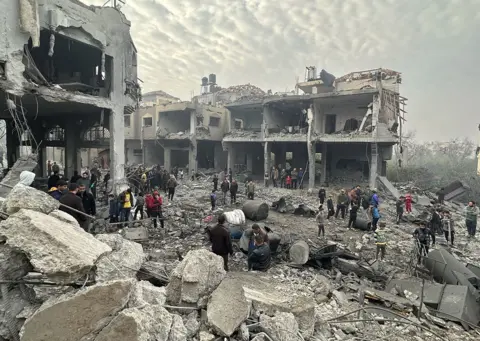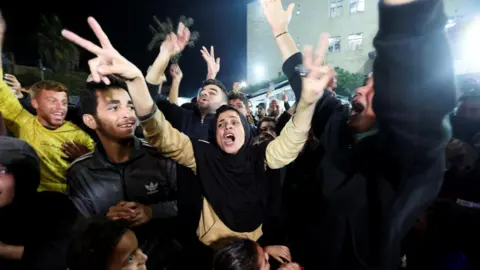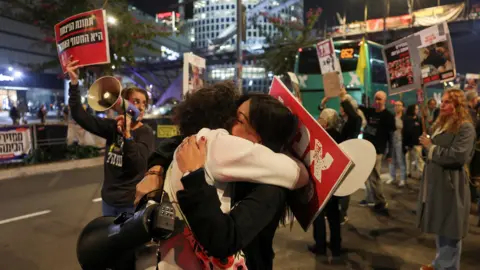Gaza ceasefire deal reached by Israel and Hamas
Israel and Hamas have agreed a Gaza ceasefire and hostage release deal following 15 months of war, mediators Qatar and the US say.
Qatari Prime Minister Sheikh Mohammed bin Abdul Rahman Al Thani said the agreement would come into effect on Sunday so long as it was approved by the Israeli cabinet.
US President Joe Biden said it would "halt the fighting in Gaza, surge much needed-humanitarian assistance to Palestinian civilians, and reunite the hostages with their families".
Israeli Prime Minister Benjamin Netanyahu said the deal's final details were still being worked on, but he thanked Biden for "promoting" it. Hamas leader Khalil al-Hayya said it was the result of Palestinian "resilience".
Many Palestinians and Israeli hostages' families celebrated the news, but there was no let up in the war on the ground in Gaza.
The Hamas-run Civil Defence agency reported Israeli air strikes killed more than 20 people following the Qatari announcement. They included 12 people who were living in a residential block in the Sheikh Radwan neighbourhood of Gaza City, it said. There was no immediate comment from the Israeli military.
Israel launched a campaign to destroy Hamas - which is proscribed as a terrorist organisation by Israel, the US and others - in response to an unprecedented cross-border attack on 7 October 2023, in which about 1,200 people were killed and 251 others were taken hostage.
More than 46,700 people have been killed in Gaza since then, according to the territory's Hamas-run health ministry. Most of the 2.3 million population has also been displaced, there is widespread destruction, and there are severe shortages of food, fuel, medicine and shelter due to a struggle to get aid to those in need.
Israel says 94 of the hostages are still being held by Hamas, of whom 34 are presumed dead. In addition, there are four Israelis who were abducted before the war, two of whom are dead.
- Follow live updates on Gaza ceasefire deal
- Watch: Qatar PM announces Gaza ceasefire and hostage deal
- What we know about the Gaza ceasefire deal
Qatar's prime minister called for "calm" on both sides before the start of the first six-week phase of the ceasefire deal, which he said would see 33 hostages - including women, children and elderly people - exchanged for Palestinian prisoners in Israeli jails.
Israeli forces will also withdraw to the east away from densely populated areas of Gaza, displaced Palestinians will be allowed to begin returning to their homes and hundreds of aid lorries will be allowed into the territory each day.
Negotiations for the second phase - which should see the remaining hostages released, a full Israeli troop withdrawal and a return to "sustainable calm" - will start on the 16th day.
The third and final stage will involve the reconstruction of Gaza - something which could take years - and the return of any remaining hostages' bodies.
Israel's cabinet has to meet on Thursday morning to give its final approval.
The ceasefire and the release of the first three Israeli hostages is expected to come on Sunday although a senior Hamas official has told the BBC there are talks ongoing to bring the start forward to Thursday night.
Sheikh Mohammed said there was "a clear mechanism to negotiate phase two and three", with the agreements set to be published "in the next couple of days, once the details are finalised".
He also said Qatar, the US and Egypt, which also helped broker the deal, would work together to ensure Israel and Hamas fulfilled their obligations.
"We hope that this will be the last page of the war, and we hope that all parties will commit to implementing all the terms of this agreement," he added.
 Getty Images
Getty ImagesPresident Biden said the plan, which he first outlined eight months ago, was "the result not only of the extreme pressure Hamas has been under and the changed regional equation after a ceasefire in Lebanon and the weakening of Iran - but also of dogged and painstaking American diplomacy".
"Even as we welcome this news, we remember all the families whose loved ones were killed in Hamas's 7 October attack, and the many innocent people killed in the war that followed," a statement added. "It is long past time for the fighting to end and the work of building peace and security to begin."
At a later news conference, Biden also acknowledged the assistance of President-elect Donald Trump, who put pressure on both parties by demanding hostages be released before his inauguration on Monday.
"In these past few days, we've been speaking as one team," he said, noting that most of the implementation of the deal would happen after he left office.
Trump was first to confirm reports the agreement had been reached, beating the White House and Qatar to a formal announcement.
In a later post on social media, he attempted to take the credit for the "epic" agreement, saying it "could have only happened as a result of our historic victory in November".
Israeli Prime Minister Benjamin Netanyahu's office thanked Trump "for his help in promoting the release of the hostages, and for helping Israel end the suffering of dozens of hostages and their families".
"The prime minister made it clear that he is committed to returning all the hostages by any means necessary," it said, before adding that he had also thanked Biden.
Later, the office said an official statement from Netanyahu would "be issued only after the completion of the final details of the agreement, which are being worked on at present".
Israel's President, Isaac Herzog, said the deal would bring with it "deeply painful" moments and "present significant challenges", but that it was "the right move".
The agreement is expected to be approved by the Israeli cabinet, possibly as soon as Thursday morning, despite opposition from Netanyahu's far-right coalition partners.
Then the names of all the Palestinian prisoners due for release will be made public by the Israeli government, and the families of any victims will be given 48 hours to appeal. Some of the prisoners are serving life sentences after being convicted of murder and terrorism.
Hamas's chief negotiator and acting Gaza chief, Khalil al-Hayya, said the agreement represented "a milestone in the conflict with the enemy, on the path to achieving our people's goals of liberation and return".
The group, he added, would now seek to "rebuild Gaza again, alleviate the pain, heal the wounds".
But he also warned "we will not forget, and we will not forgive" the suffering inflicted on Palestinians in Gaza.
 Reuters
ReutersAs news of the agreement emerged, pictures showed people cheering and waving Palestinian flags in the central Gaza town of Deir al-Balah and southern city of Khan Younis.
Sanabel, a 17-year-old girl living to the north in Gaza City, told BBC OS: "All of us are delighted."
"We have been waiting for this for a long time," she said. "Finally, I will put my head on my pillow without worrying... It is time to heal."
Nawara al-Najjar, whose husband was among more than 70 people killed when Israeli forces launched an operation to rescue two hostages, said: "After the ceasefire I want to give my children the best life."
"I want them to get over the fear we lived. My children are really scared. The terror has settled in their hearts."
 Reuters
ReutersSharone Lifschitz is a British-Israeli woman whose 84-year-old father Oded is among the remaining hostages. Her mother, Yocheved, was also abducted in the 7 October attack but was released after several weeks in captivity.
She told the BBC in London as news of the deal came through that it felt "like a bit of sanity", but she admitted: "I know that the chances for my dad are very slim."
"He's an elderly man, but miracles do happen. My mum did come back, and one way or another, we will know. We will know if he's still with us, if we can look after him."
She warned: "There are more graves to come and traumatised people to come back, but we will look after them and make them see light again... May this be the start of something better."
Moshe Lavi, the brother in-law of Omri Miran, a 47-year-old father-of-two young children, told the BBC that it was "a very mixed day for most families of hostages".
"We want to see our families come home from their mass captivity. But we also understand that this is a phase deal. Only the first phase was agreed upon," he said.
"We'll have to keep fighting, keep advocating as families with all leaders with our own government to understand they have to release all the hostages."
UN Secretary-General Antonio Guterres said the "priority now must be to ease the tremendous suffering caused by this conflict".
